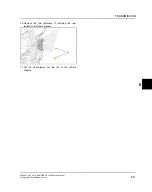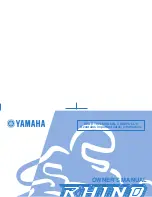
5.36
9928487 R01 - 2018 RANGER XP 1000 Service Manual
© Copyright Polaris Industries Inc.
SITUATION
PROBABLE CAUSE
REMEDY
-Dragging brake
-Slow, easy clutch engagement
-Inspect brake system.
-Fast, effective use of throttle for
efficient engagement.
PVT cover overheating (melting)
-Plugged air intake or outlet.
-Belt slippage due to water, oil,
grease, etc., rubbing on cover.
-Clutches or weight being applied to
cover while in operation.
-High vs. low range.
-Clear obstruction
-Inspect system. Clean , repair or
replace as necessary.
Seal PVT system ducts.
-Remove weight. Inform operator.
-Instruct operator on guidelines for
operation in proper driving range for
different terrain as outlined in Owner’s
Safety and Maintenance Manual.
Water ingestion
-Cover seals or ducts leaking
-Operator error
-Find leak and repair as necessary.
-Instruct operator on guidelines for
operation in wet terrain as outlined in
Owner’s Safety and Maintenance
Manual.
Belt slippage
-Belt worn out
-Water ingestion
-Belt contaminated with oil or grease
-Replace belt.
-Inspect and seal PVT system.
-Inspect and clean.
PVT noise
-Belt worn or separated, thin spots,
loose belt
-Broken or worn clutch components,
cover hitting clutches
-Replace belt.
-Inspect and repair as necessary.
Engagement
erratic or stabby
-Thin spots on belt, worn belt
-Drive clutch bushings stick
-Replace belt. Refer to belt burnt
troubleshooting and instruct operator.
-Inspect and repair clutches.
Groove on the side of the belt next
to the cogs up to approximately
0.10” (0.25 mm) deep
Interaction with Flange-Sleeve
System
No action needed. This is a Function of
the EBS mechanism
Grooving on the inner cogs of belt
next to Stationary Sheave.
Sticking of the Flange Sleeve
Assembly
Inspect the Stationary Shaft and Flange
Sleeve Bushings, EBS Spring, and
Drive Helix. Clean / Replace as
necessary
















































